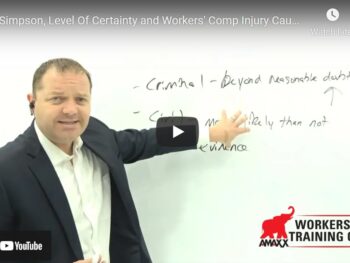As more companies and organizations nationwide are discovering, volunteering can be beneficial to both the employer and the employee, in this case, someone volunteering to work for your company.
Whether you run a major company, a not-for-profit charity or the smallest of businesses in the smallest of towns, volunteers can be of great benefit to your goals as a business person.
Americans Volunteered Nearly 7.9 Billion Hours
According to a 2013 national study from the Corporation for National and Community Service (CNCS) and the National Conference on Citizenship (NCoC), one in four adults (26.5 percent) volunteered through an organization in 2012, demonstrating that volunteering remains an important activity for millions of Americans.
Altogether, 64.5 million Americans volunteered nearly 7.9 billion hours in 2012; the estimated value of this volunteer service is nearly $175 billion, based on the Independent Sector’s estimate of the average value of a volunteer hour.
With that said, what are the rules and regulations for business owners and others when they have volunteers working under them?
Volunteering typically means one is working without monetary compensation, but what about other benefits or provisions they should be given, including workers compensation?
Click Link to Access Free PDF Download
“Avoid the 3 Primary Reasons Injured Workers’ Hire Attorneys”
What If a Volunteer is injured on the Job?
One of the biggest concerns for anyone overseeing a business that utilizes volunteer workers is an on-the-job injury.
While something as simple as a paper cut or small bruise likely doesn’t involve any concern, things like falls, notable lacerations and other injuries could and should involve concern, especially if the person employing the volunteer does not have proper workers compensation coverage.
According to information from CIMA Volunteers Insurance, laws vary from state to state in regard to providing coverage for volunteers.
In cases where a state does not have such a requirement, it is not unheard of for organizations and other such businesses to acquire accidental medical reimbursement policy coverage, allowing them to be protected should a volunteer or volunteers be hurt on the job.
One such scenario is the following:
• A volunteer working for an organization that builds homes for the homeless is injured during a construction project. The business/organization in charge of constructing said home does not have workers comp coverage. As a result, will the injured party turn around and sue the organization/business to pay for their medical expenses? Just as any organization that uses vehicles to voluntarily deliver products and services to those in need should have the proper auto insurance coverage, they too will want drivers to have coverage.
Whether or not your state provides coverage for volunteer workers is something your business/organization needs to know before accepting any volunteer workers.
Sample of Volunteer Workers Compensation State Laws:
• New York – In the Empire State, those people serving as volunteers for nonprofit organization and receive no monetary compensation are NOT covered;
• Wisconsin – Here you will find the state’s workers compensation insurance act does in fact NOT provide comp coverage for volunteers, including volunteers of non-profit organizations that attain financial compensation or other things of value totaling not more than $10.00 per week. (s.102.07(11) and 102.07(11m)). Volunteers cannot be covered under a workers comp policy and cannot receive workers comp benefits if they incur an injury or illness during the course of their voluntary service. Lastly, the workers comp law has no jurisdiction over any other form of relief that may be available to a volunteer;
• South Carolina – In the Palmetto State, unpaid volunteers are looked upon as gratuitous employees, and are not subject to the Workers Compensation Act. Organizations that have volunteers working under their watch can obtain coverage/insurance for volunteers;
• Alaska – In the nation’s last frontier, the state’s Workers Compensation Act requires each employer having one or more employees in Alaska to obtain workers comp insurance, unless the employer has been approved as a self-insurer. Determining employee status is accomplished utilizing the relative-nature-of-the-work-test as set out in Alaska Regulation 8 AAC 45.890. There are few exceptions to those who need to be covered under a workers’ compensation policy. Generally speaking, those include: sole proprietors in a sole proprietorship; general partners in a partnership; executive officers in a nonprofit corporation, members in a member managed limited liability company, part-time baby-sitters, cleaning persons (non-commercial), harvest help and similar part-time/transient help, sports officials for amateur events, contract entertainers, commercial fishers, taxicab drivers whose compensation is by contractual arrangement, a participant in the Alaska temporary assistance program, and professional hockey team players and coaches if those persons are covered under a health care insurance plan. In addition, executive officers in a for-profit corporation may exempt themselves by filing an Executive Officer Waiver with the department.
Other special provisions set out in statute include:
• High school students in work study programs are covered under the Act as employees of the state;
• Volunteer emergency medical technicians are covered under the Act as employees of the state;
• Volunteer fire fighters are covered under the act as employees of the local fire department.
As you can see, volunteers typically do not fall under the same category when it comes to regular employees.
Whether you head a small or large organization or a regular business, be sure to check with your state’s workers comp department to know and understand the workers compensation rules for volunteers.
Author Michael B. Stack, CPA, Principal, Amaxx Risk Solutions, Inc. is an expert in employer communication systems and part of the Amaxx team helping companies reduce their workers compensation costs by 20% to 50%. He is a writer, speaker, and website publisher. www.reduceyourworkerscomp.com. Contact: mstack@reduceyourworkerscomp.com.
©2014 Amaxx Risk Solutions, Inc. All rights reserved under International Copyright Law.
WORK COMP CALCULATOR: http://www.LowerWC.com/calculator.php
MODIFIED DUTY CALCULATOR: http://www.LowerWC.com/transitional-duty-cost-calculator.php
WC GROUP: http://www.linkedin.com/groups?homeNewMember=&gid=1922050/
SUBSCRIBE: Workers Comp Resource Center Newsletter
Do not use this information without independent verification. All state laws vary. You should consult with your insurance broker, attorney, or qualified professional.










